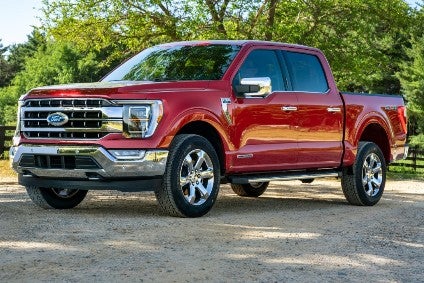
The fourth quarter picture continued to improve for automakers recovering from the ‘COVID Correction’. The yawning 33.4% chasm of Q2 shrank to a 2.4% deficit in Q4 as total volume rose 41.6%.
Deliveries hit nearly 4.2m units in the final quarter of 2020 and the full year total was slightly more than 14.65m, down 14.4% from 2019. The Korean carmakers fared the best in both quarterly and full year results. They were followed by the European brands. The American companies fared the worst in Q4 but the Japanese had the worst aggregate full year numbers.

Discover B2B Marketing That Performs
Combine business intelligence and editorial excellence to reach engaged professionals across 36 leading media platforms.
A number of companies were in the black in Q4. Volvo was the most improved with sales up 17.1% compared to Q4 2019, followed by Tesla. General Motors, Toyota, Mazda, Subaru and Volkswagen Group also beat their year ago numbers.
Tesla, Mazda and Volvo also managed to best their full year totals from 2019.
Crossovers and SUVs continued to dominate the market, capturing 50.8% of Q4 deliveries and 49.5% of the year’s total turnover. Passenger cars’ market slice continued to shrink: cars accounted for fewer than one in four sales in the fourth quarter and just over one in four for the whole year. Pickups, both full-size and mid-size, claimed 19.9% of Q4 sales and 20% of all 2020 deliveries.
Minivan sales took a big hit when the Dodge Grand Caravan was discontinued. The end of the popular model also weighed heavily on FCA’s quarterly and annual tallies. FCA had the worst annual results of the Detroit automakers but had a smaller deficit than Ford in Q4.
The Ford F-Series pickup continued its four-decade reign as the best-selling vehicle in America. The Chevrolet Silverado was able to regain second place by outselling the Ram. The Toyota Tacoma remained king of the mid-size pickups.
Toyota also claimed the top spot among utility brands, beating No. 2 Jeep in both Q4 and full-year numbers. The RAV4 was the most popular of the utes. The Camry added another year as the best-selling car.
BMW was the top premium marque in 2020 by a convincing margin. Lexus was the runner-up in Q4 but Mercedes-Benz held onto the No. 2 spot for the year.
Average transaction prices rose again in Q4, as did down payments and amounts financed. New vehicles are pricing themselves out of the reach of many Americans, who are now turning to more affordable used cars, especially vehicles coming off leases.
One of the more momentous changes in the industry could be completed this week. Officials at both PSA Group and Fiat Chrysler Automobiles have targeted 16 January as the date to make the change to Stellantis. It’s somewhat bittersweet: after nearly a century, Chrysler will become just a brand. Of course, the same is true of Fiat and Peugeot, but I grew up with Chrysler.
On the other hand, I am sure that, somewhere, the spirit of Sergio Marchionne is smiling.
It will be interesting to see how Carlos Tavares and Mike Manley rationalise the various product lines. Will Peugeot make a return to the US under its own name or will it be wearing a Chrysler or Dodge badge?
A more immediate concern is the outlook for 2021. The upheaval created by the novel coronavirus and the measure necessary to contain it is still in a state of flux. Even with the new vaccines, it will be a while before life can return to a semblance of normality and even longer before the total damage created by the pandemic can be assessed. Thousands of businesses have been shuttered and millions of people are unemployed. Considering that many of these people were former managers and employers, the pool of potential new vehicle buyers has grown smaller.
One positive sign is the fact sales were able to rebound so quickly. Even with the shortfall, 2020’s results were better than would have been predicted six months ago.






